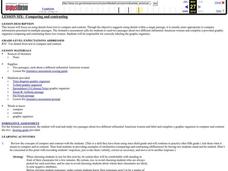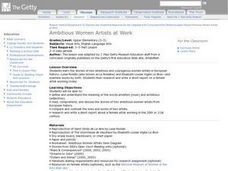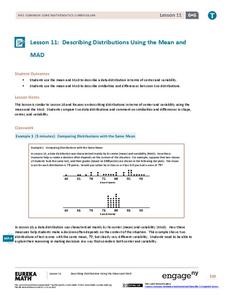Curated OER
Greater Than, Less Than 20
Learners compare number sets. They study each number pair then compare them using the greater than, less than, or equals symbols. There are 10 problems to solve.
Curated OER
Anno's Mysterious Multiplying Jar
Upper graders write word problems and research the uses of multiplication. They start off by taking a pre-test on multiplication and then read the book, Anno's Mysterious Multiplying Jar. They make up word problems to go with their...
Curated OER
Comparing and Contrasting
Analyze historical biographies. Young scholars compare and contrast the biographies of Susan B. Anthony and Pat Nixon. They construct graphic organizers, answer critical thinking questions, complete a formative assessment.
Curated OER
Multiplication: A Treasure Hunt to Two and Three Digit by One Digit Multiplication
Here is a math lesson plan which has learners practice multiplying two and three digit numbers by one digit numbers. They discuss multiplication strategies and use those strategies to play a game.
Curated OER
Charlie Crocodile
Charlie Crocodile introduces himself as the guy who wants to eat the biggest numbers. Let Charlie show kids how to determine which number is greater than or less than by pointing his sharp toothed mouth in the direction of the large...
Curated OER
Shopping-Unit Pricing
Comparing unit prices of food products is a skill that learners will use for the rest of their lives. Here is a simple plan that provides practice calculating the unit price for various grocery store products. Use two jars with differing...
Ohio Literacy Resource Center
Compare & Contrast Essay
Comparing two texts can build a greater understanding of the texts and themes of the works. Take some time to follow the steps here to guide your pupils through the process of composing compare-and-contrast essays.
School Improvement in Maryland
Political Systems: Advantages and Disadvantages
Every political system has advantages and disadvantages. To gain an understanding of these differences, groups investigate the political system of another country—oligarchy, monarchy, dictatorship, parliamentary—and prepare a...
Advocates for Human Rights
Human Rights Defined
Class members continue their investigation of the factors that influence migration with a lesson plan on human rights. As they examine the Universal Declaration of Human Rights and selected US Constitutional Amendments, learners compare...
National Endowment for the Humanities
Life Before the Civil War
American life before the Civil War was very different from American life today. To show this difference in a full spectrum, learners compare two communities that illustrate the differences between Northern and Southern life. Throughout...
Classroom Law Project
Who are the major candidates and where do they stand?
Who were the candidates in the 2008 US Presidential election and where did they stand on important issues? Use a resource that offers an opportunity to go back in time and examine candidates and issues involved in that election year.
EduGAINs
Introduction to Solving Linear Systems
Word problems offer class members an opportunity to learn the concept of solving linear systems using graphs. Individuals choose a problem based upon preferences, break into groups to discuss solution methods and whether there is...
Teach Engineering
What is a Nanometer?
Teams learn about the size of a nanometer by measuring objects and converting those measurements. A worksheet then tests the groups' abilities to use nanometers by having them determine the size of objects that are too small to measure.
LABScI
Taxonomy: Who is in My family?
Find similarities in seemingly unlike organisms. The second instructional activity in a series of 12 builds the concept of a taxonomy and explores the use of a dichotomous key. Learners begin in part one by attempting to group a set of...
Shodor Education Foundation
Spinner
Go round and round to compare theoretical and experimental probabilities. Learners set the number of sectors and the number of spins for a spinner. Then, a table displays the experimental and theoretical probabilities of the spinner for...
J. Paul Getty Trust
Ambitious Women Artists at Work
Ambition is the keyword of a lesson that focuses on the contributions made by famous female artists. Specifically looking at European artists, Luisa Roldan and Elisabeth Louise Vigee Le Brun, scholars examine a piece of their work then...
Noyce Foundation
Which is Bigger?
To take the longest path, go around—or was that go over? Class members measure scale drawings of a cylindrical vase to find the height and diameter. They calculate the actual height and circumference and determine which is larger.
Balanced Assessment
Smaller, Larger, In-Between
Build a solid understanding of rational number relationships by asking class members to use various skills to order decimals, fractions, and numeric power expressions. Using the resource, they find that the fractions do not have an...
EngageNY
End-of-Module Assessment Task: Grade 8 Module 1
It's all in the numbers. Determine your pupils' level of understanding of scientific notation using this assessment task. The final lesson in the series assesses scholars on the application of scientific notation in real-life situations....
EngageNY
Comparison Shopping—Unit Price and Related Measurement Conversions II
Which rate is greater and by how much? Pupils continue to compare rates to solve problems in the 20th portion of a 29-part series. Rates are presented in a variety of representations either using the same representation or different...
CK-12 Foundation
Fraction Ordering with Lowest Common Denominators: Test Your Strength
Young mathematicians use a bell and hammer to see how high or low the puck goes. Then, they order the fractional values to demonstrate the greatest to lowest hit. Students then respond to several questions that require them to use...
EngageNY
Describing Distributions Using the Mean and MAD II
The 11th lesson in the series of 22 is similar to the preceding lesson, but requires scholars to compare distributions using the mean and mean absolute deviation. Pupils use the information to make a determination on which data set is...
EngageNY
Understanding Box Plots
Scholars apply the concepts of box plots and dot plots to summarize and describe data distributions. They use the data displays to compare sets of data and determine numerical summaries.
Fluence Learning
Writing About Literature Shakespeare and Plutarch
The Oscar for the Best Adapted Screenplay acknowledges a writer's excellence in adapting material found in another source. What do your class members know about adapted resources? Find out with an assessment that asks readers to compare...
Other popular searches
- Author Comparison
- Comparison Paragraphs
- Comparison Contrast Paragraph
- Comparison/contrast Essay
- Comparison and Contrast
- Degrees of Comparison
- Making Comparisons
- Comparison Contrast Essay
- Comparison Vocabulary Words
- Comparison Essay
- Esl Comparisons
- Comparison Contrast

























